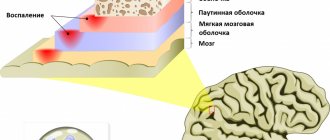Causes of headaches in early pregnancy
Headache can be associated both with physiological (normal) processes in the body and with a number of diseases. The simplest causes are fatigue, stress and physical activity, and poor nutrition. However, in the early stages, significant changes occur in the functioning of the endocrine, immune, nervous and other systems, which can lead to chronic headaches.
Hormonal changes
One of the common reasons why headaches occur in early pregnancy is hormonal changes. They are necessary for the body’s adaptation to a new state, as well as for the consolidation and further development of the fetus. An increase in their level in the blood can be accompanied by discomfort and headache.
- Progesterone is one of the first hormones that begins to be produced during pregnancy. It inhibits the functioning of the immune system, due to which the embryo attaches freely and is not rejected by the body like a foreign body. Side effects when it increases in the blood are swelling and headaches.
- Estrogens are produced throughout life, but at the beginning of pregnancy their concentration increases sharply. These substances accelerate various metabolic processes and normalize blood pressure in hypertension. They can cause mood swings and headaches.
- Human chorionic gonadotropin controls the production of other hormones. Its concentration increases until the 11th week of pregnancy, and then gradually decreases. By its level in the blood you can determine the exact period, as well as assess the course of pregnancy.
Many patients in the early stages worry whether they may have a headache during pregnancy and whether this condition is dangerous for the unborn child. Doctors at the Clinical Institute of the Brain say that headaches, discomfort and deterioration in well-being do not pose a danger if they do not persist constantly. If you have any doubts or the headache becomes too intense, you should consult your doctor.
Increase and decrease in blood pressure
Hypertension is high blood pressure. In the initial stages of pregnancy, an acceleration of all metabolic processes is observed, including an increase in blood pressure. Hypertension is accompanied by headache, redness of the skin and mucous membranes, and nausea. During a normal pregnancy, it can be caused by the following processes:
- increasing the volume of circulating blood;
- the formation of a new placental-uterine circulation;
- increased heart rate.
Normally, blood pressure does not change during pregnancy, but if there is insufficient elasticity of blood vessels or the presence of concomitant diseases, it can either increase or decrease. Hypotension is caused by increased estrogen levels and other changes. It is manifested by headache, increased heart rate and weakness, pallor of the skin and mucous membranes.
Doctors say that most often problems with blood pressure during pregnancy are an exacerbation of chronic diseases. In ordinary life, they do not show any symptoms, but are detected when the load on the cardiovascular system increases. It is easy to measure blood pressure periodically at home.
Toxicosis
In the early stages of pregnancy, toxicosis occurs in many women. There are several theories of its origin that explain the possible reasons for the deterioration of well-being. The most common of them states that toxicosis develops as a result of adaptation of the immune system to the appearance of a foreign protein in the body. Nausea, dizziness and headaches are typical reactions to the formation and consolidation of the embryo. Also, in the early stages of pregnancy, subcortical centers in the brain are activated, which are responsible for various protective reflexes, including the vomiting center.
Toxicosis does not pose a danger to the health of the mother and the development of the fetus if its manifestations can be controlled. Thus, in most pregnant women, nausea and headaches occur only in response to different tastes and smells. If these symptoms persist constantly, lead to weight loss or the appearance of acetone in the urine, urgent medical attention is needed.
Anemia
During pregnancy, physiological (normal) anemia develops. It is associated with a significant increase in blood volume and a slight increase in the number of red blood cells. The percentage of these indicators changes, which allows the pregnant woman to maintain normal well-being.
Pathological anemia can occur with various diseases, and also as a complication of toxicosis. Dehydration, lack of nutrients and poor nutrition are the main causes of this condition. It poses a danger to the development of the fetus, especially in the early stages, since a large amount of oxygen and nutrients are needed for normal fetal formation.
Other reasons
Headache is not a separate disease, but a symptom of many conditions. It occurs when there is insufficient blood supply to the brain, vascular spasms, and increased stress on the cardiovascular system. There are a huge number of reasons that can trigger pain in early pregnancy, including:
- surges in blood glucose levels;
- infectious and colds - at the beginning of pregnancy their likelihood increases due to suppression of the immune system;
- migraines - become more frequent due to hormonal changes;
- deficiency of vitamins and nutrients, microelements (magnesium, folic acid);
- consequences of old injuries.
During pregnancy, there is often an exacerbation of chronic diseases, which provokes frequent migraine attacks. In addition, headaches can be caused by stress, physical strain, and high workload. During this period, it is important to monitor your diet and take into account that the need for vitamins and microelements gradually increases.
Causes of migraine during pregnancy
“The problem of migraines often occurs in women,” comments the doctor. “And pregnancy can make it worse.” Most often, headaches appear during early pregnancy, which is associated with impaired outflow of venous blood due to changes in the woman’s hormonal status.”
This condition is physiological, although it causes discomfort for the expectant mother. But there are other causes of headaches that doctors take into account.
- Vegetovascular dystonia. If your blood pressure rises, severe headaches may occur during pregnancy. They are localized in the temporal region, but can also concentrate in the back of the head, in the forehead area. The pain can pulsate, grow and intensify gradually, and against the background of emotional experiences become unbearable. In this case, disturbances in general well-being may be observed: dizziness, nausea. This condition is dangerous for a woman’s health, and therefore requires special medical supervision.
- Toxicosis. Headache during pregnancy in the first and second trimesters may be a manifestation of toxicosis. It is characterized by squeezing, squeezing sensations and can concentrate in the neck and back of the head. Its intensity is more pronounced in the morning and evening, and decreases during the day.
- Preeclampsia. Painful sensations can occur against the background of severe gestosis, and disappear when it disappears.
- Venous insufficiency . If a woman had signs of venous insufficiency before pregnancy, they may get worse. In this case, you may experience squeezing or bursting headaches, the intensity of which increases in a horizontal position and decreases with short walking or drinking warm drinks. Typically, a woman feels relief when she lies on a bed with a high pillow and her head elevated.
“If a woman is bothered by a headache during pregnancy, it is important to understand what caused it,” comments Ekaterina Zhumanova. — First of all, you need to make sure that it is not associated with high blood pressure. The patient should be taught to measure blood pressure and control it. If necessary, the doctor will prescribe painkillers.”
pixabay.com/
Headache examination
During your routine check-up, it is important to tell your doctor if you have headaches in early pregnancy. At the Clinical Brain Institute, you can undergo comprehensive diagnostics and determine the cause of your headache. To do this, simple methods are prescribed that will not harm the health of the mother and child:
- examination by a neurologist with testing of reflexes - it is important to accurately describe the nature of the headache, the conditions and time of its occurrence;
- general and biochemical, as well as additional blood tests - will help identify inflammatory processes, acute and chronic diseases of internal organs, hormone levels and other important indicators;
- Ultrasound of the heart and other internal organs is an accessible diagnostic method, thanks to which you can detect a number of diseases and monitor their progress.
In the early stages of pregnancy, the possibility of carrying out some tests is excluded, since they can negatively affect the formation of the fetus. Thus, radiography and magnetic resonance imaging are recommended to be postponed and not performed during pregnancy. The exception is situations in which these studies are vital for the health of the expectant mother.
Treatment methods
Treatment of headaches in early pregnancy is carried out under the supervision of a doctor. At home, you can only take medications that are approved by your doctor after an examination. In the early stages, paracetamol and its analogues (Solpadeine), as well as drotaverine in various tablets (No-Shpa), are allowed. Minor headaches can be eliminated with simple techniques that do not require the use of medications:
- proper rest - must necessarily include long walks in the fresh air, physical activity;
- complete cessation of bad habits;
- proper nutrition with a sufficient amount of vitamins and microelements; it is also recommended to take special vitamin complexes for pregnant women;
- neck and head massage (can be performed independently) is one of the ways to quickly relieve spasms without pills and eliminate headache symptoms;
- for prevention - regular measurement of blood pressure, blood tests, examination by a doctor according to schedule.
The Clinical Brain Institute specializes in identifying the causes and treatment of headaches. During pregnancy, these symptoms cause concern for the expectant mother, so it is important to seek medical help promptly. Our center has modern equipment, thanks to which diagnostics have become as accurate as possible. Treatment is selected individually, taking into account the effectiveness of the prescribed regimen.
Clinical Brain Institute Rating: 4/5 — 4 votes
Share article on social networks
Prevention of headaches in pregnant women
To prevent headaches from tormenting the expectant mother, she should:
- sleep at least 8 hours a day;
- eat often - 5-6 times a day - but in small portions;
- include vegetables and fruits rich in vitamins and minerals in your diet; they also contain carbohydrates, which are properly absorbed and help avoid hypoglycemia;
Fruits are rich in vitamins and healthy sugars necessary for pregnant women
- give up fast food and other “chemical” foods; limit intake of foods that cause headaches;
- walk more in the fresh air, do gymnastics, go to the pool, but do not subject the body to heavy physical activity;
- limit “communication” with the computer;
- try not to be nervous, avoid stress.








